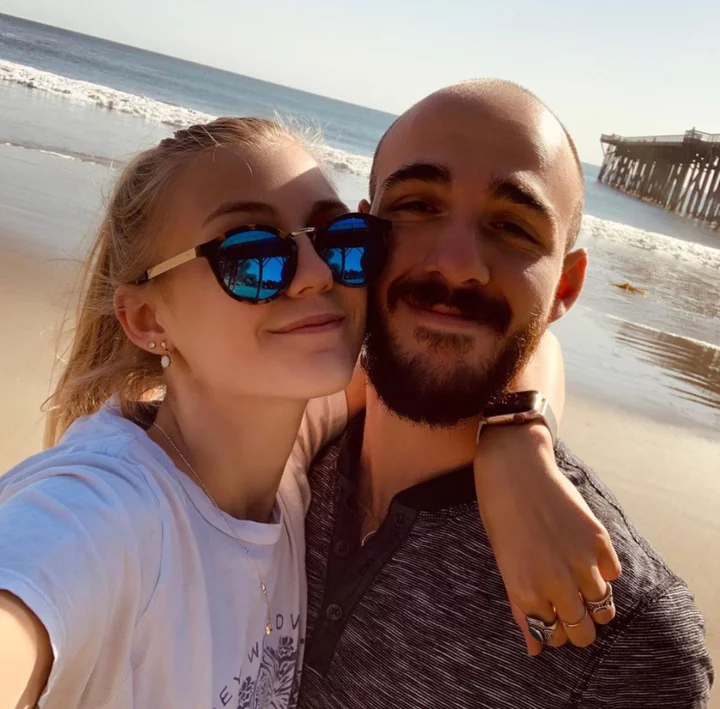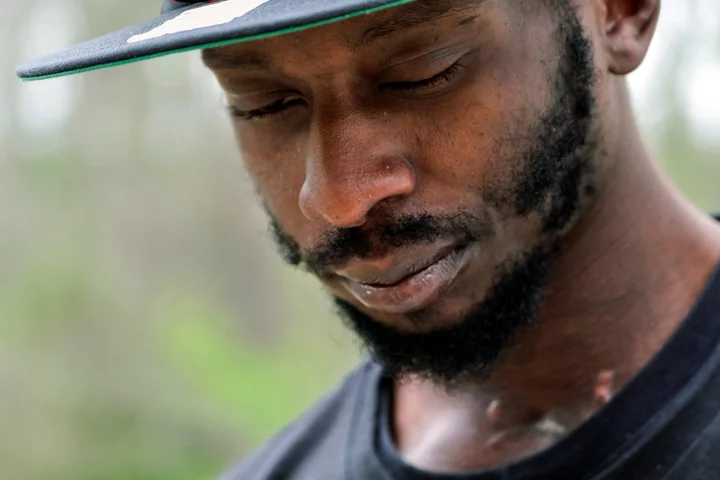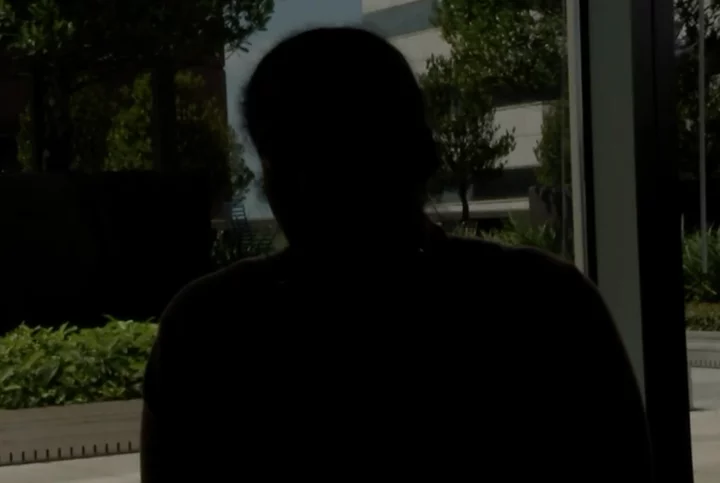
‘Killers of the Flower Moon’: The Grim True Story of the Osage Murders
'Killers of the Flower Moon' tells the story of the Osage murders, an especially bleak chapter of American history.
1970-01-01 08:00

Utah man arrested for posing as doctor and selling fake Covid cure after three years on the run
A man in Utah has been arrested after allegedly posing as a doctor and making at least $2m by selling a fake cure for Covid-19. He evaded arrest for almost three years. Gordon Hunter Pedersen, 63, who lives in Cedar Hills, Utah, was arrested last week on Wednesday after he was charged in 2020 with seven felonies, including mail and wire fraud, selling of misbranded drugs with intent to defraud and mislead, the US attorney’s office in the state said on Monday. He allegedly sold a "structural alkaline silver" online and claimed that the drug "resonates or vibrates at a frequency that destroys the membrane of the (COVID-19) virus, making the virus incapable" of infecting humans, court documents said. He posed to his customers as an "anti-ageing medical doctor" with PhD degrees in immunology and naturopathic medicine, it said. A warrant for Mr Padersen was issued in August 2020 when he failed to appear in a court for the indictment, leading to a three-year manhunt. The arrest in the case comes a month after he was spotted on surveillance camera footage at a gas station around 40 miles south of Salt Lake City. Mr Padersen promoted his fake cure through YouTube videos, Facebook posts, podcasts and websites, wearing a white lab coat with “Dr” monogrammed on it. “There is no drug that man has made that can do the same,” he said in his podcast interview in March 2020. “If you have the silver in you, when the virus arrives, the silver can isolate and eliminate the virus,” he added. He maintained that his silver product can destroy Covid-19 virus in an interview with federal agents but acknowledged that his credentials were exaggerated. He had been promoting a cure for diseases such as arthritis, diabetes and pneumonia, since 2014. But he substantially profited between January and April 2020 when he made approximately $2m in sales from the company he co-owned, My Doctor Suggests, according to court records. The US District Court for Utah filed a restraining order against Mr Pedersen to stop him from selling the products by labelling them cure-alls, the Justice Department said at that time. Following three years of evading authorities, Mr Pedersen was identified by a Food and Drug Administration special agent on 5 July, while he was in a vehicle registered under his wife’s name, Julia Currey, according to prosecutors. The agent tracked the vehicle to a gas station, where Mr Pedersen was captured on a surveillance camera, as stated by prosecutors. His indictment was part of a task force created by attorney general Merric Garland in 2021 to prosecute businesses and entities that tried to “profit unlawfully from the pandemic. His lawyer is yet to comment on the development. Read More Marjorie Taylor Greene addresses online conspiracy theory linking her to Jan 6 pipe bomber Trump claims mystery press conference report clears him of Georgia election charges – live updates Trump shares moody new video with poem voiceover about ‘suffering to win’
1970-01-01 08:00

The moment Ukraine used an experimental drone to attack a Russian bridge
Ukrainian security services have released to CNN exclusive footage showing the moment in July when they used an experimental sea drone to attack Russia's bridge to annexed Crimea, providing new details on the attack and warning more such assaults will follow.
1970-01-01 08:00

How undercover sting outwitted pangolin traffickers
How charity investigators went undercover to outwit a global wildlife trafficking gang.
1970-01-01 08:00

Brian Laundrie’s family to face depositions this week in Gabby Petito wrongful death suit
Brian Laundrie’s family will be deposed this week in a civil lawsuit filed by Gabby Petito’s parents for causing emotional distress when the doomed couple was considered to be missing. Joe Petito and Nichole Schmidt claim Christopher and Roberta Laundrie knew Gabby was dead when she vanished in August 2021 while on a road trip with their son Brian, but chose not to take any action other than saying they hoped she would be found. They are set to be questioned by the Laundries’ legal counsel team, as well family attorney Steven Bertolino, who is also named in the suit, according to WFLA. It’s not yet known if the Laundries will be present for the depositions, but if they are, it’ll be the first time the two sets of parents have come face-to-face since Laundrie’s suicide shortly after Gabby was murdered. Cassie Laundrie, Brian Laundrie’s sister, is the only family member who has spoken publicly since Gabby’s death. “Obviously me and my family want Gabby to be found safe,” Cassie Laundrie said in 2021. “She’s like a sister and my children love her, and all I want is for her to come home safe and sound and this to be just a big misunderstanding.” She is set to be questioned by the legal team for Mr Petito and Ms Schmidt on 6 November as part of the series of depositions leading up to a trial in May 2024 in Sarasota County court. The Petitos sued Brian Laundrie’s parents, accusing them of knowing that their son had murdered Gabby and then helped him with the coverup for nearly a month before her body was found in western Wyoming in September 2021, causing mental anguish, pain and suffering. Gabby, 23, was reported missing in August 2021. She had been on a road trip with her fiancé Brian, who returned to his Florida home without her. The couple had traveled by van across the US in the summer of 2021, visiting scenic places in Colorado and Utah before heading north. They documented their trip in detail, in real time, on social media. But their happy travels were not as they made it out to be online. Police in Moab, Utah, pulled over the van after it was seen speeding and hitting a curb at the entrance to Arches National Park in August 2021. Petito told police she and Laundrie had been fighting. Officers separated the couple for the night and didn’t pursue charges. Petito’s body was found a month later near a campground on the edge of Wyoming’s Grand Teton National Park. A coroner determined she’d been strangled a few weeks earlier. A month later, Laundrie was found dead in Florida. Earlier this year, a handwritten note by Roberta Laundrie in an envelope that read “burn after reading” was released after a Florida judge ruled that it could be used as evidence in a lawsuit. The undated note reportedly informed her son that she would “dispose of a body” if needed because she loved him so much, according to copies of the note shared publicly by attorneys for Petito’s parents. The letter reads in part: “We will always love each other. If you’re in jail, I will bake a cake with a file in it. If you need to dispose of a body, I will show up with a shovel and garbage bags.” Roberta Laundrie claims in a sworn statement in the Florida case that she gave it to her son just before he and Petito left on a cross-country van trip. “I was trying to connect with Brian and repair our relationship as he was planning to leave home," the statement said. “I had hoped this letter would remind him how much I loved him.” The Petito family expressed doubt about Roberta Laundrie’s claimed timing of her letter, suggesting it was in fact written after Petito’s death. Read More Mother of man who killed Gabby Petito said in letter she would help son 'dispose of a body' Bombshell letter where Brian Laundrie’s mother vowed to ‘dispose of body’ is given to Gabby Petito’s parents Brian Laundrie’s mom ‘offered to bake him a cake with a shiv’ if he was jailed for Gabby Petito murder
1970-01-01 08:00

Latin Americans fall prey to more online scams as cybersecurity lags
By Carolina Pulice MEXICO CITY Gabriella Batalha didn't think much when she noticed she had been logged out
1970-01-01 08:00

‘Candy Man’ serial killer’s last unidentified victim is seen in new image 50 years after mass grave discovered
A new sketch of the last known victim of the notorious “Candy Man” serial killer Dean Corll has been released 50 years after he was discovered in a mass grave. For decades, the young man whose mutilated body was found in belted brightly-colored swim trunks has only been known as “Swimsuit Boy” or “John Houston Doe” – but now officials are hoping the new sketch will finally be able to give the victim his name back. The facial rendering was released by the National Center for Missing & Exploited Children (NCMEC) last week, on the 50th anniversary of the day many of the bodies were found in mass graves on 9 August 1973. Corll, who was infamously nicknamed “The Candy Man” because he was known to hand out free candy to kids at his parents’ candy store, terrorised young men in the Houston area in the early 1970s. Between 1970 and 1973, Corll and his accomplices David Owen Brooks, then 17, and Elmer Wayne Henley, then 18, kidnapped, tortured, raped and killed at least 28 males between the ages of 13 and 20. It’s believed the number of slayings, known as the “Houston Mass Murders,” were far more than 28. The victims’ remains were found after Henley led Houston police to a boat storage shed, where 17 bodies were found wrapped in plastic or sheets and buried under a layer of lime plaster, according to Dean Corll: The True Story of The Houston Mass Murders: Historical Serial Killers and Murderers, by Jack Rosewood. On 8 August 1973, a day before the bodies were found, Henley shot and killed 33-year-old Corll with the killer’s own .22 pistol, allegedly screaming: “I can’t go on any longer! I can’t have you kill all my friends!”, Texas Monthly reported. Henley admitted direct involvement in six of the killings, and is serving six consecutive terms of 99 years of imprisonment with the Texas Department of Criminal Justice. He will be eligible for parole in October 2025 at the age of 70. Brooks died from COVID-19 in 2020 in a Galveston hospital while serving a life sentence. Over the past 50 years, investigators have been able to identify 27 of Corll’s known victims, giving each of “The Lost Boys” a name – except one – John Doe 1973. The latest attempt to identify the final victim from the 1970s horror was revived this year after Corll’s house was razed in February. At least eight victims were shot and killed at that house, officials have said. John Doe, who police believe was white possibly Hispanic, and between 15 and 18 when he was killed, was one of the 17 bodies found at the boat shed, according to NCMEC’s website. He was found with belted “Catalina” swim trunks that had bright red, turquoise, gold, and dark blue stripes. The shorts also had the letter "C" with golden wings on the silver buckle. The victim was wearing a khaki-colored long sleeved 70s style shirt that tied in the front, with a large red, white, and blue peace symbol and the letters “USA.” Dark blue corduroys, a knotted leather ankle bracelet, and brown leather cowboy boots that were 12 inches in length and had the word "NEOLITE" on the heel, were also found. It was later determined that the young man had a mild form of spina bifida, according to NCMEC. Carol Schweitzer, supervisor of NCMEC’s Forensic Services Unit, said they “remain hopeful that this young man’s family and friends are still looking for him.” “This young man’s friends and classmates would be in their late 60s to early 70s, and we hope that this new imagery reaches them and helps bring in that one single lead needed to resolve this case,” Ms Schweitzer said in a statement. “He may have siblings, cousins, classmates, neighbors, or friends who have always wondered what happened to him. This young man’s friends and classmates would be in their late 60s to early 70s and we hope that this new imagery reaches them and helps bring in that one single lead needed to resolve this case.” Anyone with information on “John Doe 1973,” is asked to call the National Center for Missing & Exploited Children at 1-800-THE-LOST or the Harris County Institute of Forensic Sciences and reference case number ML73-3356. Read More California judge charged in wife's murder expected to appear in Los Angeles court Rachel Morin – latest: Bel Air mother-of-five’s killer remains at large as Maryland police step up patrols Alex Murdaugh planned a birthday party for his son Paul from jail 10 months after killing him, book claims
1970-01-01 08:00

Mother of six-year-old who shot Virginia school teacher pleads guilty
Deja Taylor has reportedly admitted that her gun was stored in a way that the boy could access it.
1970-01-01 08:00

Rachel Morin – latest: Bel Air mother-of-five’s killer remains at large as Maryland police step up patrols
More than a week after mother-of-five Rachel Morin was found dead on a popular trail in Maryland, authorities have yet to make any arrests in the investigation into her death. Morin, 37, was last seen heading to the Ma & Pa Trail at around 6pm on 5 August. Her boyfriend reported her missing that night after she failed to return home and her body was found the following day. On Thursday, Harford County Sheriff’s Office said investigators had been made aware of potential witnesses who may have seen Morin on the Ma & Pa Trail in Bel Air on Saturday. The witnesses – either three men, two women and two dogs or two men, three women and two dogs – were urged to come forward. Officials said that these individuals had been identified and were contacted by investigators. A spokesperson for the sheriff’s office told The Independent on Tuesday that the department had increased patrol on the Ma & Pa Trail area to reassure the community in the aftermath of Morin’s tragic death, but noted that there is no perceived threat at this time. Read More Rachel Morin was found dead on a popular Maryland hiking trail. Her sister says she ‘did not go willingly’ Rachel Morin’s mother breaks silence on daughter’s killing Man who described grisly state of Rachel Morin’s body never actually saw it, sheriff says
1970-01-01 08:00

Gang of Mississippi police officers known as ‘The Goon Squad’ plead guilty to brutal torture of black men during raid on their home
Six white former police officers pleaded guilty on Monday to state charges for torturing two Black men. The men had sworn an oath to protect and serve were huddled on the back porch of a Mississippi home as Michael Corey Jenkins lay on the ground, blood gushing from his mutilated tongue where one of the police officers shoved a gun in his mouth and pulled the trigger. The roughly 90-minute period of terror preceding the shooting began late on January 24 after a white neighbor called Rankin County Deputy Brett McAlpin and complained that two Black men were staying with a white woman inside a Braxton home. McAlpin tipped off Deputy Christian Dedmon, who texted a group of white deputies who called themselves “The Goon Squad,” a moniker they adopted because of their willingness to use excessive force. “Are y’all available for a mission?” Dedmon asked. They were. Five of the former officers are from Rankin County Sheriff’s Office – Chief Investigator Brett McAlpin, Narcotics Investigator Christian Dedmon, Lieutenant Jeffrey Middleton, Deputy Hunter Elward, and Deputy Daniel Opdyke – while one is from the Richland Police Department, Narcotics Investigator Joshua Hartfield. Some of the group calls themselves the “Goon Squad,” as they were known for “using excessive force and not reporting it.” All pleaded guilty to state charges of obstruction of justice and conspiracy to hinder prosecution. Each reached individual plea agreements that include prison sentences ranging from five to 30 years, according to court records obtained by the Associated Press. The guilty pleas to the state charges arrive just over a week after all six men also pleaded guilty to 16 federal felonies “stemming from the torture and physical abuse” of two Black men. They will be sentenced for the federal charges in mid-November. According to the Justice Department’s release earlier this month, the officers admitted kicking in a door and entering a home belonging to two Black men – Michael Corey Jenkins and Eddie Terrell Parker on 24 January – without a warrant. The two men were handcuffed and arrested – without probable cause to believe they had committed any crime. The officers “called them racial slurs, and warned them to stay out of Rankin County,” according to the release. The officers reportedly “punched and kicked” Mr Jenkins and Mr Parker, “tased them 17 times, forced them to ingest liquids, and assaulted them with a dildo.” Court records detail how they burst into a home without a warrant, handcuffed Jenkins and Parker, assaulted them with a sex toy and beat Parker with wood and a metal sword. They poured milk, alcohol and chocolate syrup over their faces and then forced them to strip naked and shower together to conceal the mess. Then one of them put a gun in Jenkins’ mouth and fired. As Jenkins lay bleeding, they didn’t render medical aid. They knew the mission had gone too far and devised a hasty cover-up scheme that included a fictitious narcotics bust, a planted gun and drugs, stolen surveillance footage and threats. The deputies were under the watch of Rankin County Sheriff Bryan Bailey, who called it the worst episode of police brutality he has seen in his career. On top of other torturous behaviour, the former officers devised a cover-up, involving making false statements and charging the two men with crimes they did not commit, but also neglected to provide medical aid to them. Law enforcement misconduct in the U.S. has come under increased scrutiny, largely focused on how Black people are treated by the police. The 2020 killing of George Floyd by Minneapolis police ignited calls for sweeping criminal justice reforms and a reassessment of American race relations. The January beating death of Tyre Nichols by five Black members of a special police squad in Memphis, Tennessee, led to a probe of similar units nationwide. In Rankin County, the brutality visited upon Jenkins and Parker was not a botched police operation, but an assembly of rogue officers “who tortured them all under the authority of a badge, which they disgraced,” U.S. Attorney Darren LaMarca said. The county just east of the state capital, Jackson, is home to one of the highest percentages of Black residents of any major U.S. city. A towering granite-and-marble monument topped by a Confederate soldier stands across the street from the sheriff’s office. The officers warned Jenkins and Parker to “stay out of Rankin County and go back to Jackson or ‘their side’ of the Pearl River,” court documents say, referencing an area with higher concentrations of Black residents. Kristen Clarke, head of the Justice Department’s Civil Rights Division, said the trauma “is magnified because the misconduct was fueled by racial bias and hatred.” She mentioned another dark chapter in Mississippi law enforcement: the 1964 kidnapping and killing of three civil rights workers. The violent police misconduct is a reminder “there is still much to be done,” Clarke said. Read More Former Mississippi officers expected to plead guilty to state charges for racist assault Alabama riverfront brawl videos spark a cultural moment about race, solidarity and justice Civil suit can continue against corrupt former deputy linked to death of Mississippi man
1970-01-01 08:00

Six former Mississippi police officers plead guilty to state charges for torturing two Black men
Six white former police officers pleaded guilty on Monday to state charges for torturing two Black men. The men had sworn an oath to protect and serve were huddled on the back porch of a Mississippi home as Michael Corey Jenkins lay on the ground, blood gushing from his mutilated tongue where one of the police officers shoved a gun in his mouth and pulled the trigger. The roughly 90-minute period of terror preceding the shooting began late on January 24 after a white neighbor called Rankin County Deputy Brett McAlpin and complained that two Black men were staying with a white woman inside a Braxton home. McAlpin tipped off Deputy Christian Dedmon, who texted a group of white deputies who called themselves “The Goon Squad,” a moniker they adopted because of their willingness to use excessive force. “Are y’all available for a mission?” Dedmon asked. They were. Five of the former officers are from Rankin County Sheriff’s Office – Chief Investigator Brett McAlpin, Narcotics Investigator Christian Dedmon, Lieutenant Jeffrey Middleton, Deputy Hunter Elward, and Deputy Daniel Opdyke – while one is from the Richland Police Department, Narcotics Investigator Joshua Hartfield. Some of the group calls themselves the “Goon Squad,” as they were known for “using excessive force and not reporting it.” All pleaded guilty to state charges of obstruction of justice and conspiracy to hinder prosecution. Each reached individual plea agreements that include prison sentences ranging from five to 30 years, according to court records obtained by the Associated Press. The guilty pleas to the state charges arrive just over a week after all six men also pleaded guilty to 16 federal felonies “stemming from the torture and physical abuse” of two Black men. They will be sentenced for the federal charges in mid-November. According to the Justice Department’s release earlier this month, the officers admitted kicking in a door and entering a home belonging to two Black men – Michael Corey Jenkins and Eddie Terrell Parker on 24 January – without a warrant. The two men were handcuffed and arrested – without probable cause to believe they had committed any crime. The officers “called them racial slurs, and warned them to stay out of Rankin County,” according to the release. The officers reportedly “punched and kicked” Mr Jenkins and Mr Parker, “tased them 17 times, forced them to ingest liquids, and assaulted them with a dildo.” Court records detail how they burst into a home without a warrant, handcuffed Jenkins and Parker, assaulted them with a sex toy and beat Parker with wood and a metal sword. They poured milk, alcohol and chocolate syrup over their faces and then forced them to strip naked and shower together to conceal the mess. Then one of them put a gun in Jenkins’ mouth and fired. As Jenkins lay bleeding, they didn’t render medical aid. They knew the mission had gone too far and devised a hasty cover-up scheme that included a fictitious narcotics bust, a planted gun and drugs, stolen surveillance footage and threats. The deputies were under the watch of Rankin County Sheriff Bryan Bailey, who called it the worst episode of police brutality he has seen in his career. On top of other torturous behaviour, the former officers devised a cover-up, involving making false statements and charging the two men with crimes they did not commit, but also neglected to provide medical aid to them. Law enforcement misconduct in the U.S. has come under increased scrutiny, largely focused on how Black people are treated by the police. The 2020 killing of George Floyd by Minneapolis police ignited calls for sweeping criminal justice reforms and a reassessment of American race relations. The January beating death of Tyre Nichols by five Black members of a special police squad in Memphis, Tennessee, led to a probe of similar units nationwide. In Rankin County, the brutality visited upon Jenkins and Parker was not a botched police operation, but an assembly of rogue officers “who tortured them all under the authority of a badge, which they disgraced,” U.S. Attorney Darren LaMarca said. The county just east of the state capital, Jackson, is home to one of the highest percentages of Black residents of any major U.S. city. A towering granite-and-marble monument topped by a Confederate soldier stands across the street from the sheriff’s office. The officers warned Jenkins and Parker to “stay out of Rankin County and go back to Jackson or ‘their side’ of the Pearl River,” court documents say, referencing an area with higher concentrations of Black residents. Kristen Clarke, head of the Justice Department’s Civil Rights Division, said the trauma “is magnified because the misconduct was fueled by racial bias and hatred.” She mentioned another dark chapter in Mississippi law enforcement: the 1964 kidnapping and killing of three civil rights workers. The violent police misconduct is a reminder “there is still much to be done,” Clarke said. Read More Former Mississippi officers expected to plead guilty to state charges for racist assault Alabama riverfront brawl videos spark a cultural moment about race, solidarity and justice Civil suit can continue against corrupt former deputy linked to death of Mississippi man
1970-01-01 08:00

Texas woman awarded $1.2bn after ex-boyfriend posted revenge porn online
A Texas woman has been awarded more than one billion dollars after explicit images of her body were shared on porn websites by her former partner. Attorneys for the woman, who is only identified in court documents as Jane Doe, told ABC News that the $1.2bn award was more than what they were expecting. The woman filed her civil lawsuit in Harris County Civil Court in April 2022, alleging that her ex-boyfriend Marques Jamal Jackson had shared her nudes on fake Twitter, Facebook and YouTube profiles. The defence also alleged that Mr Jackson, who did not attend the one-day-long civil trial, then forwarded the profiles to the woman’s friends, family, and colleagues. Deliberations before the jury reached an agreement regarding the award sum — the largest civil verdict in the Lone Star State so far this year — only took 30 minutes. Speaking out following the trial, the woman said having pictures of her naked body shared without her permission had left her traumatised. “This type of experience is devastating,” the woman told ABC. “It’s extremely painful. It’s hurtful. It’s embarrassing and you fear that either something will trigger and it will start again or that the previous effort inspired someone new and then they might start.” According to court documents obtained by KHOU 11, the woman and Mr Jackson met in 2016 and went on to have a four-year relationship. When they broke up in 2021, Mr Jackson allegedly shared her nudes on Facebook, Twitter, Dropbox, and Pornhub. The woman’s attorney Jacob Schiffer said that Mr Jackson had access to a camera system installed on her mother’s property as well as her login information for several social media and email accounts. Mr Schiffer said Mr Jackson would even hack into the woman’s Zoom meetings to show her nudes. “Every day was me, wake up, I’m checking, I’m trying to prevent it, I’m trying to constrain it,” the woman recounted to ABC. At one point, her attorney told ABC, Mr Jackson reportedly emailed her: “...won’t change the fact that you will spend the rest of your life trying and failing to wipe yourself off the internet. Everyone you ever meet will hear the story and go looking.” The Independent could not find legal representation listed for Mr Jackson. The victim said that she unsuccessfully asked police for help and after a year of living in fear that more of her pictures would be shared online, she hired legal counsel. Mr Schiffer said that while he doesn’t expect Mr Jackson to pay the money, he hopes the hefty sum sends a message. “For the future, anyone thinking of wanting to do this to somebody else that is going to weigh on them like a ball and chain until the date that they’re buried,” Mr Shiffer said. Sharing intimate material without a person’s consent is considered a felony. It is unclear whether the victim plans to file criminal charges. The Independent has reached out to the woman’s attorneys. Read More Four in 10 women have experienced or witnessed sexual harassment on social media, research has found Thirteen-year-old girl is forced to give birth under Mississippi abortion ban How a law associated with mobsters could be central in possible charges against Trump
1970-01-01 08:00
